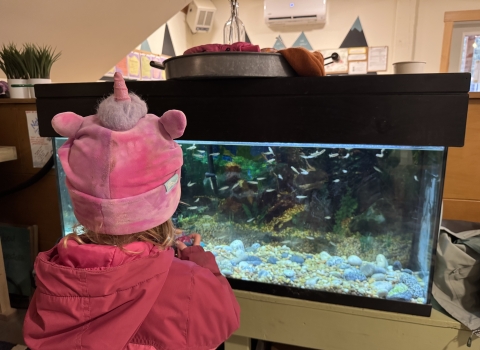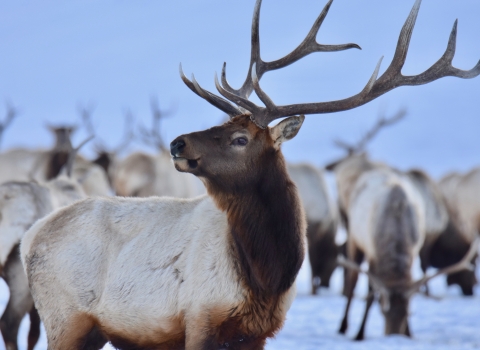The U.S. Fish and Wildlife Service today announced the purchase from the Menokin Foundation of a conservation easement conservation easement
A conservation easement is a voluntary legal agreement between a landowner and a government agency or qualified conservation organization that restricts the type and amount of development that may take place on a property in the future. Conservation easements aim to protect habitat for birds, fish and other wildlife by limiting residential, industrial or commercial development. Contracts may prohibit alteration of the natural topography, conversion of native grassland to cropland, drainage of wetland and establishment of game farms. Easement land remains in private ownership.
Learn more about conservation easement on 325 acres of the foundation's 500-acre property along Cat Point Creek in Richmond County, Va. The property will be managed as part of the Rappahannock River Valley National Wildlife Refuge, according to Joe McCauley, refuge manager.
6pt; It is the third conservation easement purchased for the refuge in the last year. In places like the Rappahannock River Valley, purchasing easements is an alternative and economical way of protecting important wildlife habitats while allowing landowners to retain property rights for certain activities such as farming, hunting, and fishing, said McCauley.
6pt; "This easement acquisition was the perfect fit because the Menokin Foundation's goals for long-term management of their property so closely matched those of the refuge. The shoreline of Cat Point Creek, which was recently designated as a bald eagle concentration area, is among the refuge's highest land protection priorities," said McCauley.
6pt; According to Sarah Dillard Pope, executive director of The Menokin Foundation, the non-profit organization will use the income from the sale to further their historic preservation, educational, and natural resources conservation efforts on the property. Menokin was the plantation and home of Francis Lightfoot Lee, who in the late 18th century served as a member of the Virginia Legislature and Virginia Conventions of 1774. He and his brother, Richard Henry, were the only pair of brothers to sign the Declaration of Independence.
6pt; "It's been a pleasure working with the U.S. Fish and Wildlife Service throughout this process, and we look forward to partnering with the agency on the stewardship of Menokin," said Helen Turner Murphy, president of the Menokin Foundation Board.
6pt; "With the majority of funds conveyed to the Menokin Foundation through the conservation easement, our organization is able to start an endowment that will provide continued stability to fulfill our mission. We will move forward to work on the next stage of stabilizing the Menokin ruins, learning from our work along the way, and creating educational programs to teach the public about how old buildings were built and how to protect them," said Murphy,
6pt; The Service established the Rappahannock River Valley National Wildlife Refuge to protect the outstanding fish and wildlife habitat that exists in and along the river. The Service set a land protection goal of 20,000 acres in seven counties, flanking both sides of the river from Skinkers Neck south to Belle Isle State Park. With the purchase of the easement from the Menokin Foundation, the Service has acquired nearly 8,000 acres from willing sellers, including almost 1,400 acres under conservation easement.
The Menokin Foundation was created in 1995 to receive the 500-acre property and historic ruin of Francis Lightfoot Lee and Rebecca Tayloe Lee's home, Menokin, which is a National Historic Landmark National Historic Landmark
National Historic Landmark is a nationally significant historic place designated by the Secretary of the Interior because it possesses exceptional value in illustrating or interpreting the heritage of the United States. More than 2,600 places bear this designation, 10 of them on U.S. Fish and Wildlife Service lands.
Learn more about National Historic Landmark . The Menokin Foundation, a 501(c)(3) organization, is governed by a Board of Trustees and dedicates itself to achieving the highest and best use for the ruin and property. To that end, the Foundation is dedicated to sharing Menokin's rich cultural and natural resources with students, scholars, and the general public through research and interactive programs and activities.
The U.S. Fish and Wildlife Service is the principal federal agency responsible for conserving, protecting and enhancing fish, wildlife and plants and their habitats for the continuing benefit of the American people. The Service manages the 95-million-acre National Wildlife Refuge System, which encompasses 545 national wildlife refuges, thousands of small wetlands and other special management areas. It also operates 69 national fish hatcheries, 64 fishery resources offices and 81 ecological services field stations. The agency enforces federal wildlife laws, administers the Endangered Species Act, manages migratory bird populations, restores nationally significant fisheries, conserves and restores wildlife habitat such as wetlands, and helps foreign and Native American tribal governments with their conservation efforts. It also oversees the Federal Assistance program, which distributes hundreds of millions of dollars in excise taxes on fishing and hunting equipment to state fish and wildlife agencies.
-FWS-

